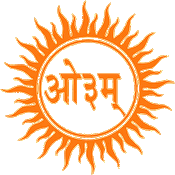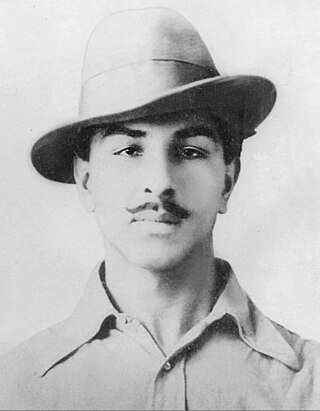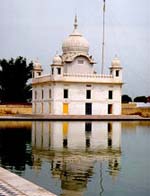
Punjab, also known as the Land of the Five Rivers, is a geopolitical, cultural, and historical region in South Asia. It is located in the northwestern part of the Indian subcontinent, comprising areas of modern-day eastern-Pakistan and northwestern-India. Punjab's major cities are Lahore, Faisalabad, Rawalpindi, Gujranwala, Multan, Ludhiana, Amritsar, Sialkot, Chandigarh, Shimla, Jalandhar, Patiala, Gurugram, and Bahawalpur.

Arya Samaj is a monotheistic Indian Hindu reform movement that promotes values and practices based on the belief in the infallible authority of the Vedas. The sannyasi (ascetic) Dayananda Saraswati founded the samaj in the 1870s.

Ranjit Singh was the founder and first maharaja of the Sikh Empire, in the northwest Indian subcontinent, ruling from 1801 until his death in 1839.

Bhagat Singh was an Indian anti-colonial revolutionary, who participated in the mistaken murder of a junior British police officer in December 1928 in what was to be retaliation for the death of an Indian nationalist. He later took part in a largely symbolic bombing of the Central Legislative Assembly in Delhi and a hunger strike in jail, which—on the back of sympathetic coverage in Indian-owned newspapers—turned him into a household name in the Punjab region, and after his execution at age 23 into a martyr and folk hero in Northern India. Borrowing ideas from Bolshevism and anarchism, the charismatic Bhagat Singh electrified a growing militancy in India in the 1930s, and prompted urgent introspection within the Indian National Congress's nonviolent but eventually successful campaign for India's independence.

Lala Lajpat Rai was an Indian revolutionary, politician, and author, popularly known as Punjab Kesari. He was one of the three members of the Lal Bal Pal trio. He died of severe trauma injuries sustained in October 1928 during a baton charge by police in Lahore, when he led a peaceful protest march against the all-British Simon Commission.

Jagraon is a city and a municipal council, a rural police district and a sub-division of the Ludhiana district in the Indian state of Punjab. Jagraon is more than three centuries old. Jagraon is at almost the geographical center of the state, 16 kilometres (9.9 mi) from the Satluj River. It is 37 km (23 mi) from its district headquarters Ludhiana, 29 km (18 mi) from Moga, 31 km (19 mi) from Nakodar and 54 miles from Barnala.
Bassi Kalan is a village in India, 12 kilometres from the district capital Hoshiarpur, near the Himachal Pradesh state border. Its population is about 10,000 people, mainly Hindus and. It's situated in the Hoshiarpur district of Punjab.
Kharal is a Punjabi Muslim tribe predominantly found in the Sandal Bar region of Punjab and some parts of Sindh.

Lala Jagat Narain was an Indian editor, member of the Punjab Legislative Assembly, Member of Parliament and founder of the Hind Samachar media group.
Hindustan Socialist Republican Association (HSRA), previously known as the Hindustan Republican Army and Hindustan Republican Association (HRA), was a radical left-wing Indian revolutionary organization, founded by Sachindranath Sanyal. After changes in Bhagat Singh's ideology and the influence of the Russian Revolution, they held meetings in Feroz Shah Kotla Maidan and added the word socialist to their name. Ram Prasad Bismil, Ashfaqulla Khan, Sachindra Nath Bakshi, Sachindranath Sanyal and Jogesh Chandra Chatterjee were the leaders of the group at the time. HSRA's manifesto titled The Revolutionary and written constitution were produced as evidence in the Kakori conspiracy case of 1925.

Haqiqat Rai Bakhmal Puri was an 18th-century martyr from Sialkot, who was executed in Lahore during the time of Zakariya Khan.

Moga is a city in the Indian state of Punjab. It was made a part and headquarters of the Moga district on 24 November 1995, by the then Chief Minister Harcharan Singh Brar. Before becoming a district, Moga was a part of Faridkot District as a tehsil. Moga is situated on the National Highway 95. The area of Dharamkot block with 150 villages has been merged into Moga district, which falls under the jurisdiction of Ferozpur division.

The Khalsa Tract Society was an organization created by Bhai Vir Singh and Kaur Singh in 1893 to promote the aims and objects of the Singh Sabha Movement. The organization had a large output of tracts over the years that touched upon various subjects.
Punjabi literature, specifically literary works written in the Punjabi language, is characteristic of the historical Punjab of present-day Pakistan and India and the Punjabi diaspora. The Punjabi language is written in several scripts, of which the Shahmukhi and Gurmukhī scripts are the most commonly used in Western Punjab and Eastern Punjab, respectively.

Harjinder Singh Dilgeer is a Sikh historian and author.
Dhudike is a village in Moga Tehsil in Moga district of Punjab state, India. It is located 17 km east from city of Moga, the district headquarter. Freedom fighters like Baba Isher Singh, Baba Pala Singh Jathedar, Baba Pakhar Singh are a few of the Gadaree from Dhudike who participated in the Ghadar Movement during the struggle for independence. Dhudike is the birthplace of the famous revolutionary Lala Lajpat Rai.
Mridula Mukherjee is an Indian historian known for her work on the role of peasants in the Indian independence movement. She is an ex-chairperson of the Centre for Historical Studies at the Jawaharlal Nehru University, Delhi, and former director of the Nehru Memorial Museum and Library.

Jagtar Singh Grewal was an Indian writer, historian, scholar, and a vice-chancellor of the Guru Nanak Dev University (GNDU).
SheikhBasharat Ullah (1801–1892), also known as Basahathullah or Basahatullah, was a Punjabi miniature painter who was employed as a court-painter for various states, such as Patiala State.
An Imaginary Rebellion and How It was Supressed is a book written by Pearay Mohan, an Indian lawyer and assistant editor of The Tribune. It was published by Khosla Brothers in 1920, shortly after the release of the Indian Congress report on the Punjab disturbances of 1919. Included in it is a foreword by the Indian revolutionary, Lala Lajpat Rai.












